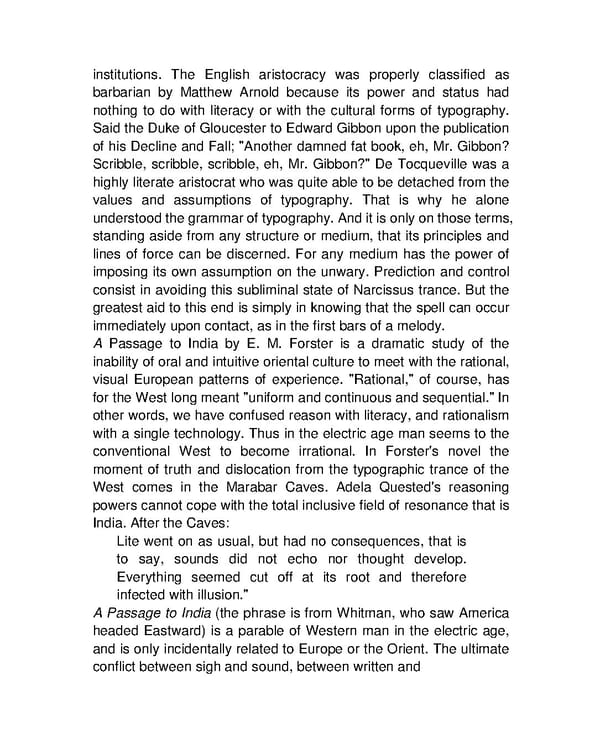institutions. The English aristocracy was properly classified as barbarian by Matthew Arnold because its power and status had nothing to do with literacy or with the cultural forms of typography. Said the Duke of Gloucester to Edward Gibbon upon the publication of his Decline and Fall; "Another damned fat book, eh, Mr. Gibbon? Scribble, scribble, scribble, eh, Mr. Gibbon?" De Tocqueville was a highly literate aristocrat who was quite able to be detached from the values and assumptions of typography. That is why he alone understood the grammar of typography. And it is only on those terms, standing aside from any structure or medium, that its principles and lines of force can be discerned. For any medium has the power of imposing its own assumption on the unwary. Prediction and control consist in avoiding this subliminal state of Narcissus trance. But the greatest aid to this end is simply in knowing that the spell can occur immediately upon contact, as in the first bars of a melody. A Passage to India by E. M. Forster is a dramatic study of the inability of oral and intuitive oriental culture to meet with the rational, visual European patterns of experience. "Rational," of course, has for the West long meant "uniform and continuous and sequential." In other words, we have confused reason with literacy, and rationalism with a single technology. Thus in the electric age man seems to the conventional West to become irrational. In Forster's novel the moment of truth and dislocation from the typographic trance of the West comes in the Marabar Caves. Adela Quested's reasoning powers cannot cope with the total inclusive field of resonance that is India. After the Caves: Lite went on as usual, but had no consequences, that is to say, sounds did not echo nor thought develop. Everything seemed cut off at its root and therefore infected with illusion." A Passage to India (the phrase is from Whitman, who saw America headed Eastward) is a parable of Western man in the electric age, and is only incidentally related to Europe or the Orient. The ultimate conflict between sigh and sound, between written and
 Understanding Media by Marshall McLuhan Page 16 Page 18
Understanding Media by Marshall McLuhan Page 16 Page 18